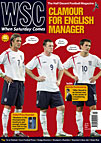 Under political pressure, UEFA are looking into the murky rules surrounding club ownership and finance. But, as Steve Menary reports, some want to stop them
Under political pressure, UEFA are looking into the murky rules surrounding club ownership and finance. But, as Steve Menary reports, some want to stop them
Over the next few months, UEFA is supposed to be reviewing how European football is run. The study of the game’s corporate and social governance was announced by the sports minister, Richard Caborn, on December 8, towards the end of the UK’s six-month presidency of the European Union. But the results of this review are far from certain and plenty are willing to debate its purpose.
At the time, Caborn was the EU’s most senior sports minister and his proposal came after a meeting involving UEFA and FIFA. In addition to examining quotas for homegrown players and continued investment into grass-roots football and stadiums, the review will focus on the testy problems of regulation of agents, club financing and ownership.
UEFA have agreed to take charge of the review and discussed the subject at an executive committee meeting on January 25, but questions for more details from most parties involved are left unanswered. The Football Association refer all calls to Caborn’s Department of Culture, Media and Sport, the DCMS, which said: “No one is under any illusions that this will be an easy task but the case for change is growing. It isn’t helpful that all the money goes into players’ wages and agents rather than grass-roots football or lower ticket prices. Football wants to do something but needs help. The EU can give legal backing to any changes, as they would be open to legal challenges.”
This leaves plenty open for discussion and finding answers will not be a quick process. A major name is likely to lead the review, but will they come from Europe’s football or political community? Euro 2008 co-hosts Austria took over the EU presidency in January and wants to focus on links between sport and the economy, but the next sub-ministerial meeting of European delegates is not until March 29 in Vienna.
With the review due for completion by June, that is a short timescale for a study that Caborn wants to produce ideas that can be acted upon before he seeks an exemption for football from the EU laws governing other industries, under the Nice declaration of 2000.
The review looks set to produce another clash with the G-14 group of major clubs, whose spokesman said: “We just hope the review looks at fundamental issues which matter to the clubs such as the calendar [and] player release.” That is a very different agenda to the one that the DCMS is talking about.
The Premier League insist they have nothing to fear, particularly over any ownership irregularities as transactions of over £25,000 by directors must be declared. English league sides are all limited companies, whose results are available for free for Stock Exchange-listed clubs or for just £4 online from Companies House for privately owned clubs. With a degree of persistence, investigators can find out who owns most clubs – most, but not all, as Ken Bates demonstrated. His tenure at Chelsea was supported by a majority shareholder whose identity was hidden by a tax haven registration and Bates challenged legally attempts to establish who that shareholder was. If the majority shareholder of one of England’s biggest clubs can remain a secret, what can UEFA really hope to achieve with this review?
The DCMS admits: “This review will fall or die on the support of the five major leagues.” The English, French, German, Italian and Spanish leagues will all be involved but what about leagues outside of the EU? There are 25 EU states and 52 members of UEFA, one of whom – Liechtenstein – was declared by the Financial Action Task Force on Money Laundering in June 2000 to be one of the world’s worst tax havens.
We know that new Portsmouth owner Arcadi Gaydamak owns Beitar Jerusalem, but only because the club is one of the biggest in Israel. What about smaller clubs? Will FAs be willing or able to help? If Hearts owner Vladimir Romanov helps supply cheap Lithuanian players to the Edinburgh club, who will complain?
Not Hearts fans if they win the league and not the Lithuanians as their players will get more money than at home and the better ones will most likely turn out for the national team and produce better results.
To counter the obvious holes, UK fans body Supporters Direct, which Caborn also wants consulted, wants clubs and associations to make declarations. Deputy chief executive Dave Boyle says: “There are too many second-order problems that are stopping first-order problems being resolved. A nightclub can’t stop me wearing jeans and trainers in my own home but they can if I want to go into their club. If people don’t want to [make declarations in] football, they should go and do something else.” No doubt there are some who hope that Caborn’s initiative fails to realise these hopes.
From WSC 229 March 2006. What was happening this month